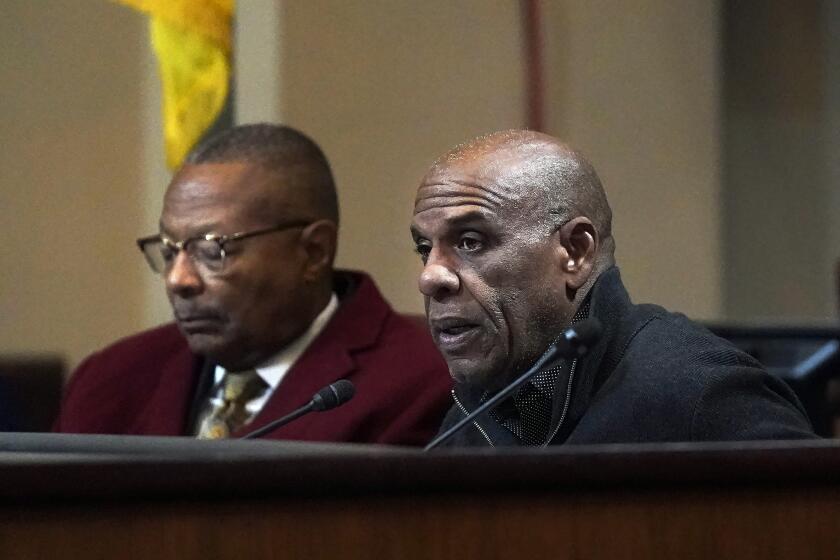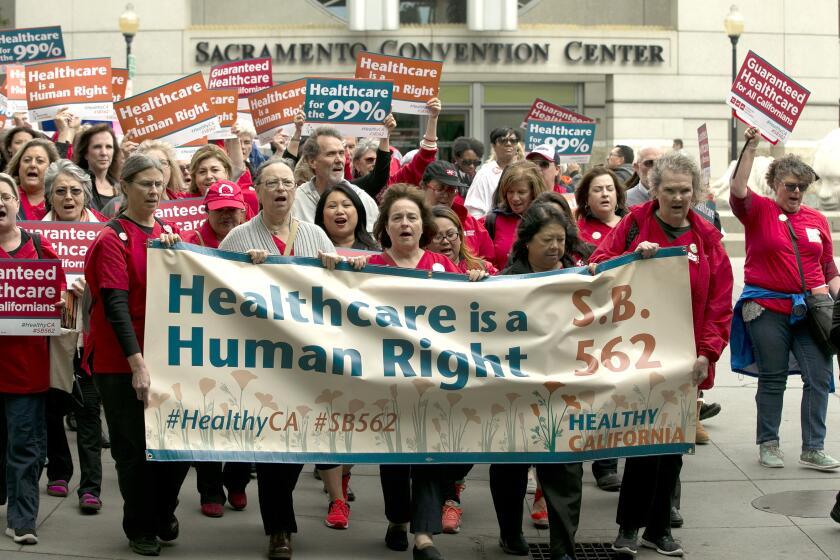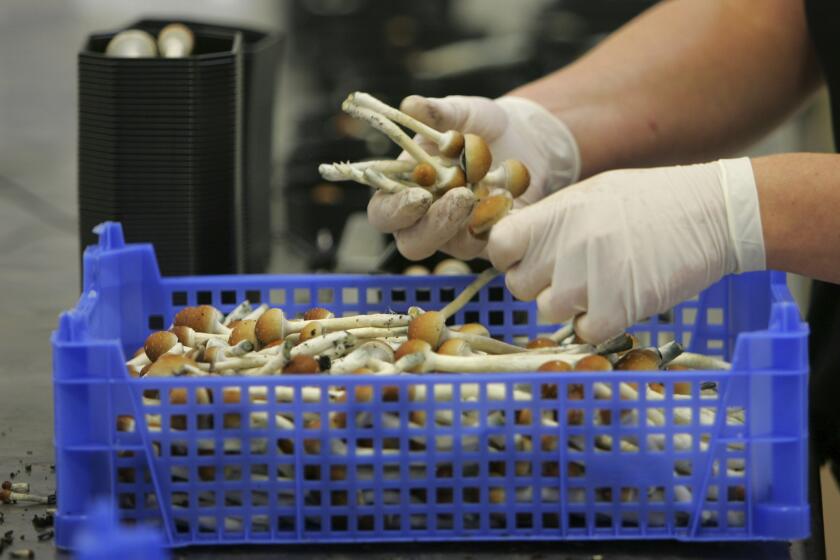Only 27 but a City Hall Elder Statesman
As election contests erupt from one end of Los Angeles to the other, the northeast San Fernando Valley is an island of political calm.
That’s because Councilman Alex Padilla, the city’s youngest lawmaker, is the only council member facing no opponent in the current campaigns. Once derided as too inexperienced for the job, the 27-year-old Padilla has emerged as a forceful leader in the working-class 7th District. He grew up there, a poor kid from Pacoima who now stands to become, by the age of 30, the Valley’s elder statesman on the City Council.
To win his seat in 1999, he had to defy and outmaneuver a longtime mentor. In less than two years in office, he has scored a $40-million Children’s Museum that is to be built in Lake View Terrace, delivered long-delayed improvements to an area known for unpaved streets and pushed--too hard, critics say--for a massive redevelopment project.
Stretching across the dusty base of the San Gabriel Mountains from Sylmar to Sun Valley, the district is a downtrodden mix of industrial areas, undeveloped land and neighborhoods crippled by poverty, violence, slum housing and inadequate health care. The population is more than 70% Latino, and the annual per capita income in the northeast Valley is about $9,300, about half that of the city as a whole.
It is an area that cries out for leadership, and Padilla--the articulate, MIT-educated son of a Mexican-born short-order cook and a housekeeper--promised to fight for the bread-and-butter city services he said the district had long been denied.
City Hall denizens are wondering about the key to Padilla’s good fortune. Is he simply doing a good job, listening to his constituents and making good on his vow to shower attention on one of the poorest parts of the city? Is he the beneficiary of term limits, which tend to discourage challenges to sitting officials? Or is Padilla, who was elected with the powerful backing of labor unions, Assemblyman Tony Cardenas (D-Sylmar) and Mayor Richard Riordan, reaping the benefits of a political machine that no one dares cross?
Many residents and community groups praise Padilla for his accessibility and attention to everyday concerns. On his watch, new sidewalks and speed bumps have sprouted across the landscape. He has helped secure money to install street lights, repair roads and expand the local Boys and Girls Club. Last month, he won his colleagues’ approval for $500,000 to subsidize sewer hookups for low-income families that rely on old, sometimes leaky, septic tanks.
Marlene Grossman, director of the nonprofit advocacy group Pacoima Beautiful, said Padilla knows the ailments hobbling his hometown so intimately that when someone complained about an unsightly tree stump during a recent meeting, he not only knew precisely which tree it was but had already prodded the city to buy a stump removal machine to help get rid of such nuisances.
“You can count on him,” Grossman said. “He comes to the [community] meetings. He’s doing what really needs to be done.”
Arthur Sweet, a Sun Valley developer, said he appreciated Padilla’s efforts to entice a metal supply company to move from Burbank to Sun Valley. The city has approved $150,000 to help the firm and its 150 employees relocate.
And on Pinney Street in Pacoima, Issac Arias, a retired factory worker who has lived in the same house for 48 years, is elated that Padilla helped get his street paved for the second time in half a century.
“He’s doing great,” Arias said. “I guess we had to wait all those years for a person who was born and raised here.”
For Padilla, his greatest achievement was winning approval for a Children’s Museum campus in his district, one of two the city plans to build. The councilman, who grew up a block away from one of the Valley’s most notorious open-air drug markets, often lectures about the need to provide activities to help young people avoid violence and drugs.
“That’s my proudest moment, because of my focus on kids, but [also] because nobody thought I had a chance of getting it done,” Padilla said of the museum. “It was the most uphill political battle I had.”
But Padilla’s determination to push his sagging district toward prosperity sometimes backfires, critics say. Some residents and business owners were particularly upset by the councilman’s support--which he later dropped--of a controversial plan to redevelop almost 7,000 acres in the northeast Valley.
The Community Redevelopment Agency’s proposal drove a wedge through the community, even sparking a fistfight at one meeting. While Padilla defended the $490-million project as a tool to create better housing and jobs, opponents accused him of trying to ramrod redevelopment by stacking a citizens committee with supporters to carry out his agenda.
Foes Kept at Bay
Faced with intense opposition, Padilla decided to shelve the project for two years, saying he was not convinced that the troubled CRA had the ability to do the job. Even so, the tactics he once used to promote the plan--including busing supporters to an election of the citizens panel overseeing the project--left some residents with a bitter aftertaste.
“When I saw him bus all those people in here, that was what turned me off,” said Victor Carreon, a Pacoima furniture manufacturer who opposed the CRA project. “That told me he was willing to do anything to have it his way, basically that he had sold himself out to the developers.”
Carreon and a few CRA opponents were sufficiently disgusted by Padilla’s actions that they began hunting for a challenger willing to take him on in the April 10 election. They hit upon Benny Bernal, a Pacoima bus driver active with the Valley secession movement. But in the end Bernal decided not to run.
Bernal and another community activist, Cynthia Valdez, said people are afraid to openly challenge the political machine that includes Padilla, Cardenas and political strategist James Acevedo. As Bernal tried to raise money for his campaign, he said, some supporters began to pull away.
“They offered support by working phone banks and behind-the-scenes stuff, but they didn’t want to write a check because that [campaign contribution] is disclosed,” Bernal said. “They said they didn’t want [Padilla’s allies] to know what they were doing.”
Acevedo, a veteran political consultant who has advised northeast Valley politicians ranging from the late Howard Finn to Alarcon, dismissed any notions of a heavy-handed machine primed to retaliate against those who do not follow Padilla. The councilman, too, denied being part of an alliance that tried to intimidate rivals.
“We’ll fight hard in campaigns, but not like that,” Acevedo said. “I think the councilman was unopposed for one reason and one reason only: He’s the person who, in his early years, has done more to move things quicker than I’ve seen done up here in a long time. I think people see that.”
Even as a freshman, Padilla has played a major role in some citywide debates. As chairman of the Information Technology Committee, he pushed for cable companies to provide open Internet access as a condition of receiving franchise approvals. Last fall, Padilla’s decision to support a consent decree with the federal government on police reform was instrumental in securing approval of the agreement.
Since taking office, Padilla has demonstrated his independence from some of the people who helped elect him. In key races in the April election, for instance, Padilla has broken with the mayor and decided to back candidates who oppose Riordan-supported contenders.
Today, the councilman moves easily between the immigrant neighborhood where he was raised and the high-powered realm of city politics. He slips from Spanish to English, trooping to Catholic Mass with his family on Sundays and chatting on his cell phone on the way home, red rosary beads dangling from the rearview mirror of his Jeep Grand Cherokee. He has taken up golf. Until last month, he lived with his parents in the family’s modest stucco house--although his evening plans sometimes included a fund-raiser at the mayor’s Brentwood mansion.
Councilwoman Laura Chick, who represents the southwest Valley, said that when Padilla landed in council chambers almost two years ago, “there was a perception that he was beholden to those entities” which had backed him.
“I think he has carved out, in a very thoughtful way, an independent path,” Chick said. “Nobody owns him. But like everyone, he cares who his friends are.”
*
Times staff writer Patrick McGreevy contributed to this story.
More to Read
Start your day right
Sign up for Essential California for news, features and recommendations from the L.A. Times and beyond in your inbox six days a week.
You may occasionally receive promotional content from the Los Angeles Times.






